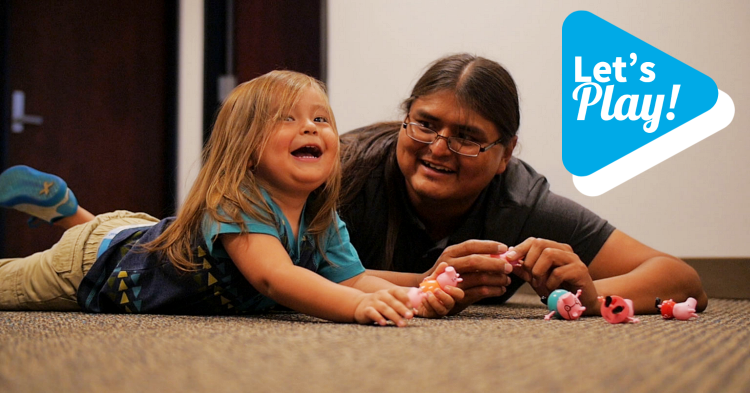
- Play helps children develop physical and social-emotional skills, as well as language, problem-solving and more.
- Playing with your child is quality time together. It helps them develop the strong emotional connection they need to feel safe and secure.
- Simple toys and everyday objects spark your child’s imagination and learning.
- Even babies learn from playtime.
Playtime is serious business for kids. For babies, toddlers and preschoolers, almost all learning happens through exploring and interacting. That’s what playtime is all about.
As a parent or caregiver, you play a vital role in supporting your child’s healthy development and learning. And understanding the importance of making time for play can help.
Why is play so important?
Play is what kids do naturally. Have fun. So it’s easy to overlook what is really going on when young children are playing — they are exploring, discovering and learning about how the world works.
The American Academy of Pediatrics (AAP) puts it this way: “Play is not frivolous. It enhances brain structure and function and promotes executive function — the process of learning, rather than the content.”
When a baby smiles and laughs in a game of peekaboo, they’re learning. When a toddler stacks blocks and then knocks them down, or a preschooler pretends to be a firefighter, they aren’t just having fun. Playing is how young kids learn.
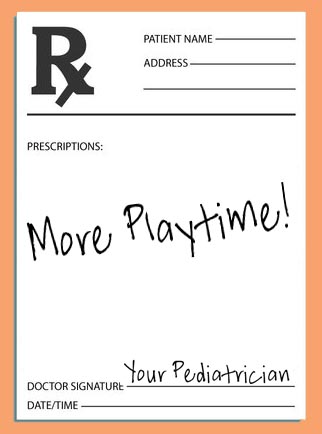
Research shows that play impacts everything from a child’s physical abilities and vocabulary to problem-solving, creativity, teamwork and empathy.
Because playtime is so important for a young child’s healthy development, and because statistics show that the amount of time children get to play has been declining for many years, the AAP urges pediatricians to prescribe play for children in their care.
“Play helps us learn. Play helps us cope. Play helps us socialize,” said Kathy Hirsh-Pasek, who co-authored the AAP report. “It’s not the opposite of work. We learn via play.”
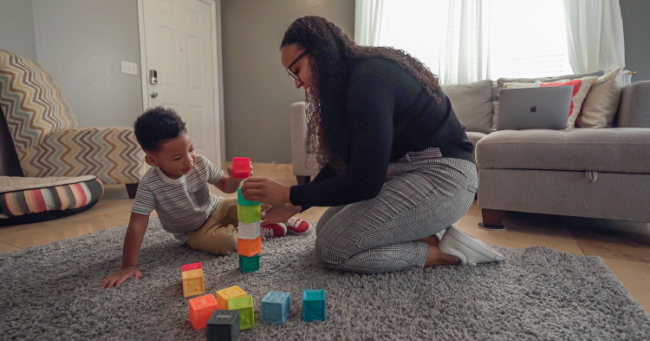
Playtime also helps children build close relationships.
In addition to learning and developing new skills, playing with your young child is also quality time that brings you closer together.
“Play supports the formation of the safe, stable and nurturing relationships with all caregivers that children need to thrive,” the AAP report states.
Strong emotional connections with their parents and caring adults help children develop a secure attachment. Knowing they can count on their parent to be there when they need them gives a child the confidence to play freely, explore, try new things and learn.
“What they most need are interactions, language, give and take,” writes Dr. Perri Klass. “Which can just be another way of saying, somebody to play with.”
3 ways you can encourage and make time for play.
Even though play is a natural instinct for children, they need the adults in their lives to support and encourage it. Here are a few tips and reminders to help:
Provide the resources for stimulating play.
These don’t have to be fancy or expensive toys. In fact, pediatricians say that simple toys are best.
“No special skills or equipment are needed,” said Dr. Klass. “Every parent learns the virtue of pots and spoons as playthings, and boxes that are more fascinating to babies than the toys they contained.”
Create a safe area where the can play freely, put some simple toys and objects where your child can see and reach them, and then let their curiosity and creativity take over.
Look for opportunities to play throughout the day.
With all of life’s busyness, it can be hard to slow down and take even a few minutes to play with your child and be fully present. The benefits of playing with your child can be lost when you’re distracted. No parent is perfect, and you don’t have to be playing with your child 24/7.
The good news is that giving your little one your focused attention even for just a few minutes at a time can make a big impact and let them know they are cared for and loved. And with toddlers and preschoolers, try to leave plenty of time in their daily schedule for spontaneous play, too.
Something as simple as stepping outdoors can open the door to endless opportunities to play outdoors, too.
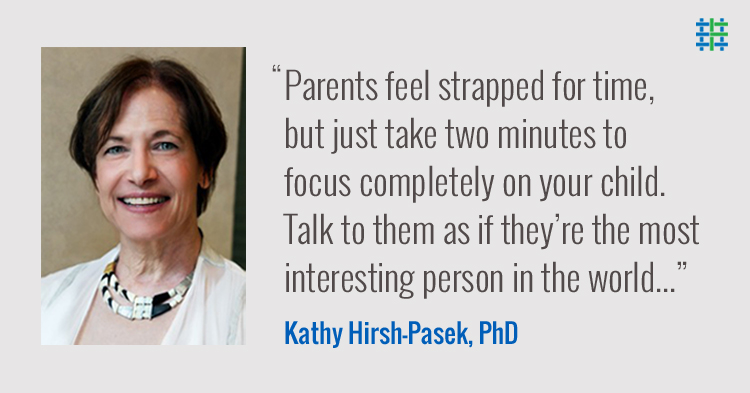
Join in the fun, but let your child take the lead.
Your child may want to pretend, they may want to play a game, they may want to go outside and run around. Go with it. You’re supporting their growing curiosity, imagination and confidence. And when you play along, with silly voices and your own childlike joy, you’re also showing your child how important they are to you.
Play FAQs
Do babies need playtime?
Absolutely! When babies play, they are learning. They benefit from such simple acts as cooing, clapping and the silly faces you make to make them laugh. But there’s a more important factor at work. A baby explores and makes sense of the world around him through play. With babies, play is as simple as grasping an object and holding on to it or talking to them in exaggerated voices. So the next time you find yourself playing peekaboo with your baby, know that you’re encouraging their healthy development and learning.
How do you play with a baby?
Babies are fascinated by faces and bright colors. They enjoy playing hide-and-seek with different objects. When your baby is active and alert, it’s a great time to play! Learn more about how to read your baby’s cues to know when they’re ready to play and when they’ve had enough for now. Here are just a few ways to play:
- Mirror play. Babies really like looking at themselves in the mirror. No, they’re not tiny egomaniacs. For your baby, looking in the mirror is play. It’s fun and fascinating. And for parents and caregivers, it’s another way to deepen your connection. Learn more about mirror play and how babies develop self awareness.
- Talkin’ Tennis. Even though they can’t use words yet, having “serve and return” conversations with your baby is the best way to help them learn and develop language. Learn how to get in the game.
- Peekaboo. It’s a classic for a reason.
- Tummy Time! Tummy time is an important way to help your baby strengthen their large muscles and learn to raise their head and body with their arms to look around. Keep in mind that tummy time is a shared activity. Your direct supervision is vital for safety, and your active participation is the key to success. Make it fun! Get some tummy time tips.
- Scarf play. Playing with scarves is great bonding and brain building time with your baby. From building positive sensory-motor skills by feeling the silky texture of a scarf to developing fine motor skills while playing catch, there are endless ways to make use of this common household item. Learn more about scarf season.
What types of toys are best for a toddler?
Pediatricians say simple toys are best. The American Academy of Pediatrics recently came out with a recommendation that the best toys for young children are the simple ones. Flashy electronic toys may catch our attention as adults, but more basic toys like blocks, books, dolls and puzzles are recommended because they help spark a child’s imagination and, most importantly, encourage quality play time between parent and child. Toddlers like to find out how things work. They test what happens when you pull, drop and carry things. They also like to play pretend and imitate adult activities. Toddlers need safe and interesting places to climb, like safe outdoor parks. Toddlers want things to take apart and put together.
Is it okay for my child to play alone sometimes?
While it’s great for your child to play with you, it’s also important for children to have some time to play on their own or with parents nearby, watching, but not involved. In fact, it can be a great thing for both of you. Time for independent play builds a child’s imagination, problem-solving skills, attention and persistence — and it also gives parents a few much-needed minutes to just be. Not every child will be interested in spending lots of time playing alone. That’s just fine. 10-20 minutes of supervised independent playtime can help your child reap the benefits without missing you too much.
How can I help my child play with others?
First, it’s very helpful to have realistic, age-appropriate expectations of your child. For example, sharing is a big, complex skill that kids develop over time. They may not understand the concept until age 3 or 4. So take some time to learn more about your child’s Ages and Stages of development. As your child gets a little older, one way you can encourage them to play with others is by setting up playdates with friends. And remember, you are your child’s first teacher. And as your child learns to play well with you, they’re also learning how to play with others.
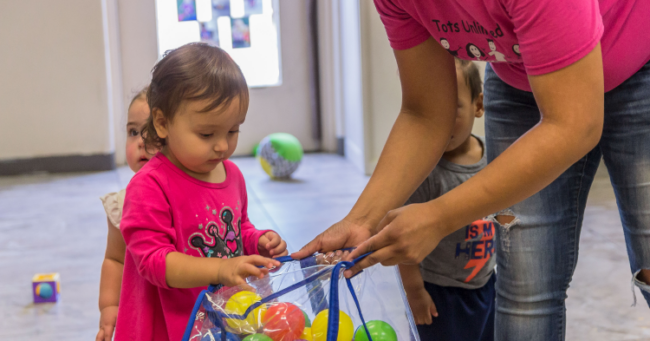
What about screen time?
Pediatricians recommend that babies and toddlers should spend very little time with electronic devices, including computers, smart phones, tablets and TV. Babies learn best from real-life play. Video-chatting apps like FaceTime are OK for short amounts of time, when used with a parent. As your child gets older, it helps to plan how much time they should spend with screens. Try to limit your own screen time as well. You can’t give your child your full attention when you are looking at a screen.
More Ways to Play
Visit our partners for more ways to help your young child have fun and learn through play:


